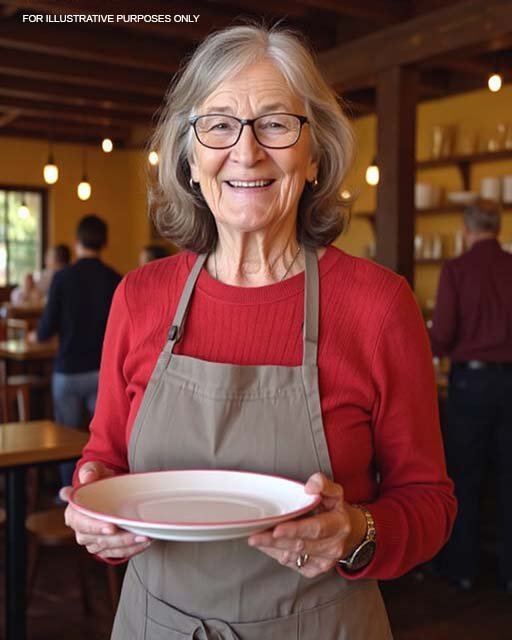He leaned on the counter, watching her. “You ever think about retiring, Nancy?”
She froze for a second, then smiled. “Oh, I’m not ready to sit around yet.”
“Just saying,” he continued, flipping open his newspaper.
“At your age, it’s a little… sad to still be serving coffee. Some people don’t know when to call it quits.”
The words hit the air like stones. I could see the small tremor in her hand as she poured his coffee.
I stood up from my table and walked to the counter before I could talk myself out of it. “That’s enough,” I said. He looked up slowly, one eyebrow arching.
“Excuse me?”
“You heard me,” I said, my voice steady but sharp. “That’s enough. You’ve been i.n.s.u.l.t.i.n.g her for weeks.
If you can’t show basic respect, you can take your business somewhere else.”
My mother’s face went pale. “Sweetheart—”
“No, Mom,” I interrupted. “He’s been cruel to you for no reason.
It ends today.”
Mr. Harrison’s mouth tightened into a thin line. He looked from me to my mother, then back.
“Ah,” he said finally. “So this is your child, the protector. How charming.”
“Just stop,” I said.
“You don’t get to talk to her like that. She’s spent her whole life working hard, raising a family, and treating people with kindness. And all you’ve done is come here every day and try to make her feel small.”
He stared at me, and for a moment, I thought he might argue.
But then something strange happened. His expression faltered. The arrogance in his eyes dimmed, replaced by something else—something that almost looked like shame.
He glanced at my mother again, then muttered, “I’ll take the coffee to go,” and left a crumpled bill on the counter before walking out without another word. I felt a rush of triumph, but it was short-lived. My mother sighed heavily, leaning against the counter.
“You shouldn’t have done that.”
“Mom, he deserved it,” I said. “You can’t let people talk to you like that.”
She shook her head slowly. “You don’t know what’s behind people’s behavior, honey.
You never know what pain they’re carrying.”
I wanted to argue, but the look in her eyes stopped me. It wasn’t anger, it was sadness. Over the next few days, Mr.
Harrison didn’t come in. I thought maybe he’d finally gotten the message. My mother, however, seemed uneasy about it.
“He’s been coming here for years,” she said one afternoon as she wiped down tables. “Maybe I should check if he’s all right.”
I gave her a look. “Mom, you don’t owe that man anything.”
“I know,” she said softly.
“But something about the way he looked that morning… I don’t know. It didn’t feel like anger. It felt like something else.”
Two days later, curiosity got the better of me.
I stopped by the café during my lunch break, and while helping my mother organize the receipts, I overheard two older customers talking near the counter. “Did you hear about Thomas Harrison?” one of them said. “Yeah,” the other replied.
“His wife passed away last year, didn’t she? Cancer, I think. Poor man’s never been the same.”
My chest tightened.
I walked over quietly. “Excuse me,” I said. “Did you say Thomas Harrison?”
They nodded.
“Used to be a lawyer. Comes here every morning, right? My sister told me his wife d.i.3.d in this very café had a heart attack while he went to pay the bill.
She didn’t make it.”
For a moment, everything went still. That afternoon, I couldn’t concentrate on anything. The image of the man sitting by the window, always alone, suddenly made painful sense.
His cruel remarks weren’t just cruelty; they were displaced grief, bitterness at a world that had taken everything from him. Still, knowing that didn’t erase what he’d done to my mother. But it explained the haunted look I’d seen flicker in his eyes when I confronted him.
The next morning, I told my mother what I’d learned. She listened quietly, her eyes glistening. “I wondered if it was something like that,” she said finally.
“He always sits in the same booth, you know the one near the window. That’s where she collapsed.”
My throat tightened. “Mom, that’s… awful.”
She nodded slowly.
“It doesn’t excuse his behavior, but it makes me understand it.”
A week later, he came back. It was early morning, and I happened to be there again, sipping a latte while scrolling through emails. When the bell over the door rang, both my mother and I looked up.
Mr. Harrison stood there, hat in hand. He looked different, older, somehow, like the air had gone out of him.
My mother smiled gently. “Good morning, Mr. Harrison.”
He hesitated, then approached the counter.
“Miss Nancy,” he began, voice rough. “I owe you an apology. And your… daughter, too.” He glanced toward me, eyes tired.
“I’ve been an ass. There’s no other word for it.”
My mother wiped her hands on her apron. “Would you like to sit down?”
He nodded, almost in relief.
For the next half hour, the café stayed unusually quiet. The other staff members worked silently as my mother and Mr. Harrison sat together at the corner booth, the one by the window.
I didn’t eavesdrop, but I caught snippets of their conversation. He told her about his wife, Helen. How they’d come to the café every morning for years, how she loved the croissants.
How, on the morning she d.i.3.d, he’d been teasing her for taking too long to finish her coffee. “She laughed,” he said softly. “That’s the last thing she did.
She laughed at my stupid joke, and then she was gone.”
My mother reached across the table and placed her hand over his. “I’m sorry,” she said simply. He nodded, eyes glistening.
“I think I came back here every day because I didn’t know where else to go. But being here without her just… hurt. And I guess I wanted everyone else to hurt, too.”
My mother didn’t scold him, didn’t preach.
She just listened. That was her gift: the ability to make people feel seen without judgment. When he finally stood to leave, he turned to me.
“I didn’t thank you the other day,” he said quietly. “You were right to call me out. I’ve been cruel to someone who didn’t deserve it.
I hope you can forgive me.”
I nodded. “Just treat her kindly next time.”
He managed a faint smile. “That’s the plan.”
From then on, he became a different kind of regular.
Still quiet, still reserved, but kinder. He started leaving generous tips, asking my mother about her day, even bringing flowers once a month, always lilies, which he said were Helen’s favorite. One morning, as I sat at my usual corner table, I watched him walk in, place his hat on the counter, and greet my mother with a gentle, “Good morning, Nancy.”
She smiled back.
“Morning, Mr. Harrison. The usual?”
He chuckled softly.
“Maybe I’ll try the apple tart today. Helen always said I needed to branch out.”
Something in his tone made my eyes sting. After he left, my mother sat down beside me.
“Funny how things change,” she said. “A little kindness goes a long way.”
I smiled. “You were the kind one, Mom.
I just… pushed the first domino.”
She reached over and squeezed my hand. “Sometimes that’s all it takes.”
Months passed. Mr.
Harrison’s health began to decline, and he stopped coming as often. When he did, my mother always made sure his coffee was perfect and his croissant warm. The last time I saw him, he pressed a small envelope into her hand.
“For you,” he said. “Don’t open it until I’m gone.”
He d.i.3.d quietly a few weeks later, and when my mother finally opened the envelope, she found a handwritten letter. “Dear Nancy,” it began, “thank you for reminding me that kindness still exists, even when we believe the world has taken it from us.
You gave me back something I thought I’d lost forever: peace. Use the enclosed check for something that brings you joy. Helen would have wanted that.”
Inside was a check for ten thousand dollars.
My mother cried that night not because of the money, but because of the letter. “He found his peace,” she whispered. “That’s worth more than anything.”
The café still smells like coffee and butter, and the bell still jingles above the door every time someone walks in.
My mother still ties her apron every morning, though her steps have slowed a little. But now, whenever she walks past the corner booth by the window, she pauses for a moment, smiles, and says softly, “Good morning, Helen.”
And every time I see her do it, I’m reminded of something she taught me without ever saying it outright: sometimes standing up for someone isn’t about fighting their battles, it’s about helping others find the humanity they lost along the way.





